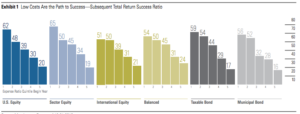Long-term data shows that passively managed index funds outshone actively managed mutual funds over many years of data collection, due mainly to significantly lower fees charged. Another important factor was humans making bad decisions under pressure and often coming up short.
Studies show that those who engage less actively in investing generally fare better over time, including one conducted by Warren Buffett who advises amateur investors to passively invest.
Fear and excitement can be your worst enemy when it comes to investing. These emotions often lead to snap decisions, short-sighted views, and doing exactly the opposite of what should be done (selling large amounts in moments of fear and buying in moments of greed).
Most of the financial services industry despises passive index investing as it reduces fees (and their profits) over time. They’ve done everything possible to discourage it – and in many ways have succeeded – though even today 70% of fund assets still favor active management (despite efforts). While that number is decreasing slowly enough.
Certain fund providers have reluctantly taken on Vanguard’s model to avoid becoming obsolete – although it has caused much discord within their ranks. They’ve often lamented this change all along the way.








+ There are no comments
Add yours